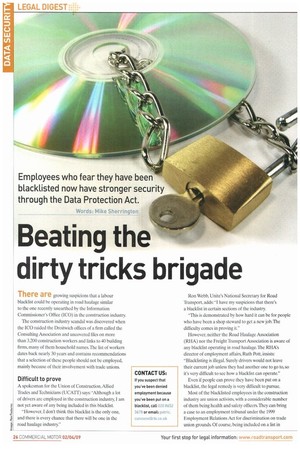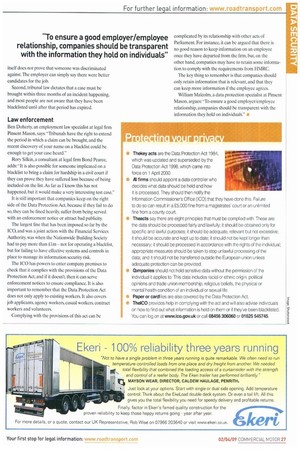Beating the dirty tricks brigade
Page 26

Page 27

If you've noticed an error in this article please click here to report it so we can fix it.
Employees who fear they have been blacklisted now have stronger security through the Data Protection Act.
Words: Mike Sherrington There are growing suspicions that a labour blacklist could be operating in road haulage similar to the one recently unearthed by the Information Commissioner's Office (ICO) in the construction industry The construction industry scandal was discovered when the ICO raided the Droitwich offices of a firm called the Consulting Association and uncovered files on more than 3,200 construction workers and links to 40 building firms, many of them household names. The list of workers dates back nearly 30 years and contains recommendations that a selection of these people should not be employed, mainly because of their involvement with trade unions.
Difficult to prove A spokesman for the Union of Construction, Allied Trades and Technicians (UCATT) says: "Although a lot of drivers are employed in the construction industry. I am not yet aware of any being included in this blacklist.
"However, I don't think this blacklist is the only one, and there is every chance that there will be one in the road haulage industry." Ron Webb. Unite's National Secretary for Road Transport, adds: "I have my suspicions that there's a blacklist in certain sections of the industry.
-This is demonstrated by how hard it can be for people who have been a shop steward to get a new job. The difficulty comes in proving it."
However, neither the Road Haulage Association (RHA) nor the Freight Transport Association is aware of any blacklist operating in road haulage. The RHA's director of employment affairs, Ruth Port, insists: "Blacklisting is illegal. Surely drivers would not leave their current job unless they had another one to go to, so it's very difficult to see how a blacklist can operate."
Even if people can prove they have been put on a blacklist, the legal remedy is very difficult to pursue.
Most of the blacklisted employees in the construction industry are union activists, with a considerable number of them being health and safety officers. They can bring a case to an employment tribunal under the 1999 Employment Relations Act for discrimination on trade union grounds. Of course, being included on a list in itself does not prove that someone was discriminated against. The employer can simply say there were better candidates for the job.
Second, tribunal law dictates that a case must be brought within three months of an incident happening, and most people are not aware that they have been blacklisted until after that period has expired.
Law enforcement
Ben Doherty, an employment law specialist at legal firm Pinsent Mason, says: "Tribunals have the right to extend the period in which a claim can be brought, and the recent discovery of your name on a blacklist could be enough to get your case heard."
Rory Silkin, a consultant at legal firm Bond Pearce, adds: -It is also possible for someone implicated on a blacklist to bring a claim for hardship in a civil court if they can prove they have suffered loss because of being included on the list. As far as I know this has not happened, but it would make a very interesting test case."
It is still important that companies keep on the right side of the Data Protection Act, because if they fail to do so, they can be fined heavily, suffer from being served with an enforcement notice or attract bad publicity.
The largest fine that has been imposed so far by the ICO, and was a joint action with the Financial Services Authority, was when the Nationwide Building Society had to pay more than flm — not for operating a blacklist, but for failing to have effective systems and controls in place to manage its information security risk.
The ICO has powers to enter company premises to check that it complies with the provisions of the Data Protection Act, and if it doesn't, then it can serve enforcement notices to ensure compliance. It is also important to remember that the Data Protection Act does not only apply to existing workers. It also covers job applicants, agency workers, casual workers, contract workers and volunteers.
Complying with the provisions of this act can be complicated by its relationship with other acts of Parliament. For instance, it can be argued that there is no good reason to keep information on an employee once they have departed from the firm, but, on the other hand, companies may have to retain some information to comply with the requirements from HMRC.
The key thing to remember is that companies should only retain information that is relevant, and that they can keep more information if the employee agrees.
William Malcolm, a data protection specialist at Pinsent Mason, argues: "To ensure a good employer/employee relationship, companies should be transparent with the information they hold on individuals." •














































































































































